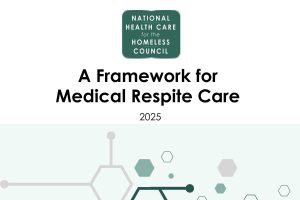Medical respite care is defined as acute and post-acute care for people experiencing homelessness who are too ill or frail to recover from a physical illness or injury on the streets or in shelter, but who are not ill enough to be in a hospital. While programs vary in size and structure, they all share the same fundamental elements: a short-term, safe place to stay, allowing people experiencing homelessness an opportunity to rest, recover, and heal in a safe environment while accessing medical care and supportive services. Medical respite care (also referred to as recuperative care) has grown substantially since its inception in the 1980’s, as more communities are recognizing the need for programs that address gaps in affordable housing and health care1 . As the field grows, so does the need for resources for programs and providers to ensure the clients* who access medical respite services are receiving safe and quality care.
This document is a framework to guide medical respite programs by:
- Defining the philosophy of medical respite care, and
- Articulating how the Guiding Principles, Standards for Medical Respite Care Programs, and the Models of Medical Respite Care are used in conjunction to provide quality care and an opportunity for recovery for people experiencing homelessness.

